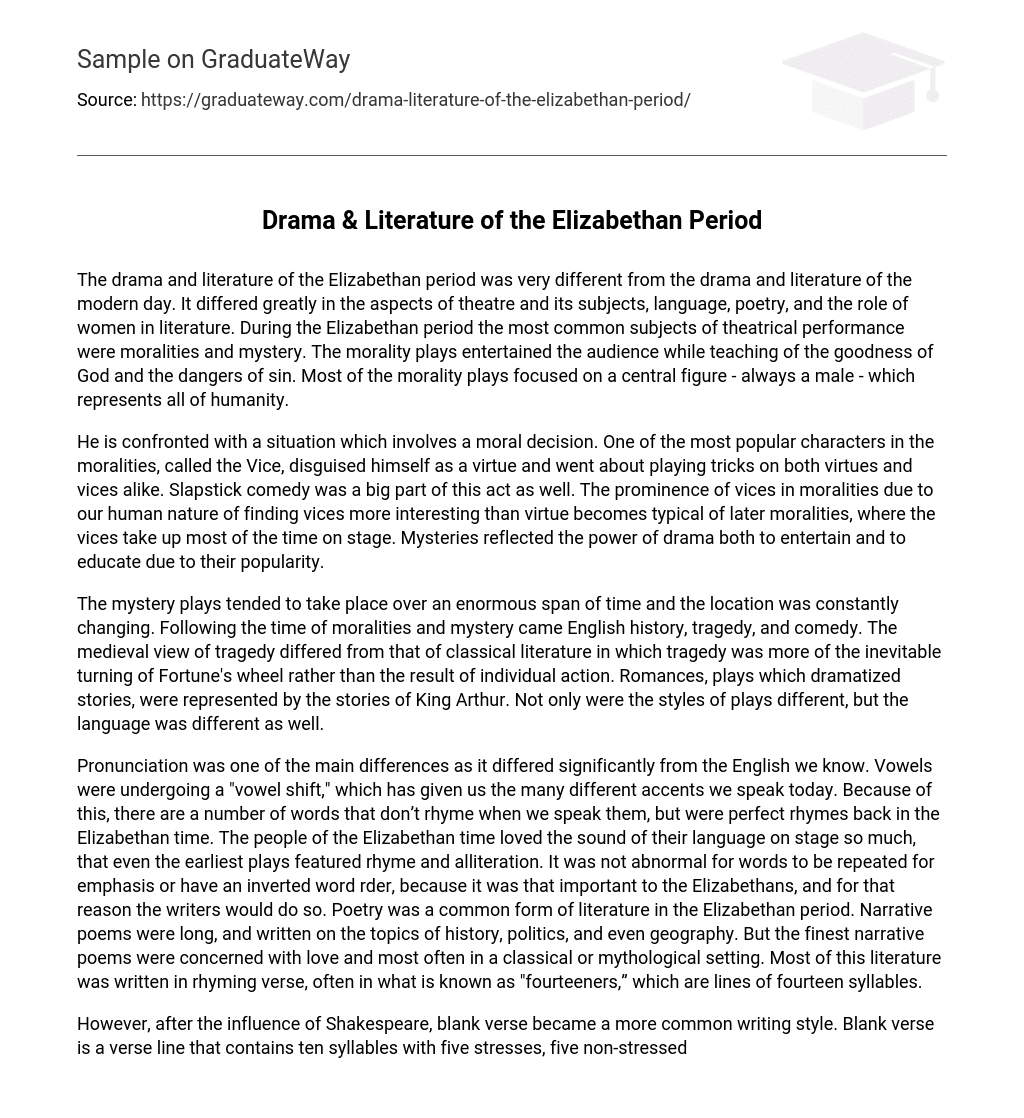The drama and literature of the Elizabethan period was very different from the drama and literature of the modern day. It differed greatly in the aspects of theatre and its subjects, language, poetry, and the role of women in literature. During the Elizabethan period the most common subjects of theatrical performance were moralities and mystery. The morality plays entertained the audience while teaching of the goodness of God and the dangers of sin. Most of the morality plays focused on a central figure – always a male – which represents all of humanity.
He is confronted with a situation which involves a moral decision. One of the most popular characters in the moralities, called the Vice, disguised himself as a virtue and went about playing tricks on both virtues and vices alike. Slapstick comedy was a big part of this act as well. The prominence of vices in moralities due to our human nature of finding vices more interesting than virtue becomes typical of later moralities, where the vices take up most of the time on stage. Mysteries reflected the power of drama both to entertain and to educate due to their popularity.
The mystery plays tended to take place over an enormous span of time and the location was constantly changing. Following the time of moralities and mystery came English history, tragedy, and comedy. The medieval view of tragedy differed from that of classical literature in which tragedy was more of the inevitable turning of Fortune’s wheel rather than the result of individual action. Romances, plays which dramatized stories, were represented by the stories of King Arthur. Not only were the styles of plays different, but the language was different as well.
Pronunciation was one of the main differences as it differed significantly from the English we know. Vowels were undergoing a “vowel shift,” which has given us the many different accents we speak today. Because of this, there are a number of words that don’t rhyme when we speak them, but were perfect rhymes back in the Elizabethan time. The people of the Elizabethan time loved the sound of their language on stage so much, that even the earliest plays featured rhyme and alliteration. It was not abnormal for words to be repeated for emphasis or have an inverted word rder, because it was that important to the Elizabethans, and for that reason the writers would do so. Poetry was a common form of literature in the Elizabethan period. Narrative poems were long, and written on the topics of history, politics, and even geography. But the finest narrative poems were concerned with love and most often in a classical or mythological setting. Most of this literature was written in rhyming verse, often in what is known as “fourteeners,” which are lines of fourteen syllables.
However, after the influence of Shakespeare, blank verse became a more common writing style. Blank verse is a verse line that contains ten syllables with five stresses, five non-stressed syllables, and no rhyme pattern. Though at this time women had the “duty” of being a housekeeper and a submissive wife to their husbands, they slowly entered their way into the world of literature. Before 1500, only a small amount of works are known to have been published by women in England.
However, between 1500 and 1640, more than one hundred works were either composed or translated by women in England. When Elizabethan women did write, they wrote poetry, prefaces, essays, prayers, letters, diaries, and confessions. The most important publish subject by women, however, was religion. English literature has come a long way since the Elizabethan time. The topics of drama and literature have greatly expanded, women have equal roles as men do, and the language is more modern. However, it’s clear the Elizabethan time period has left its mark on drama and literature for all time.





